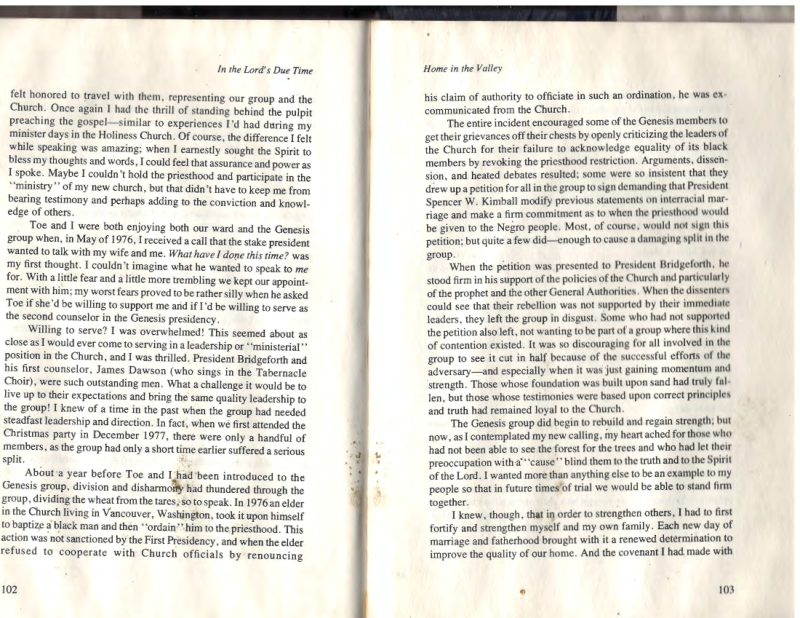Joseph Freeman reports that unauthorized ordination of a Black Saint sowed division in the Genesis Group.
- Type
- Book
- Hearsay
- Direct
- Reference
Joseph Freeman, In the Lord’s Due Time: First Black to Receive the Priesthood Following the 1978 Revelation (Salt Lake City, UT: Bookcraft, 1979), 102–103
- Scribe/Publisher
- Bookcraft
- People
- James Dawson, Joseph Freeman, Spencer W. Kimball, Douglas A. Wallace, Ruffin Bridgeforth, Toe Freeman
- Audience
- Reading Public
- Transcription
Toe and I were both enjoying both our ward and the Genesis group when, in May of 1976, I received a call that the stake president wanted to talk with my wife and me. What have I done this time? was my first thought. I couldn't imagine what he wanted to speak to me for. With a little fear and a little more trembling we kept our appointment with him; my worst fears proved to be rather silly when he asked Toe if she'd be willing to support me and if I'd be willing to serve as the second counselor in the Genesis presidency.
Willing to serve? I was overwhelmed! This seemed about as close as I would ever come to serving in a leadership or "ministerial" position in the Church, and I was thrilled. President Bridgeforth and his first counselor, James Dawson (who sings in the Tabernacle Choir), were such outstanding men. What a challenge it would be to live up to their expectations and bring the same quality leadership to the group! I knew of a time in the past when the group had needed steadfast leadership and direction. In fact, when we first attended the Christmas party in December 1977, there were only a handful of members, as the group had only a short time earlier suffered a serious split.
About a year before Toe and I had been introduced to the Genesis group, division and disharmony had thundered through the Group, dividing the wheat from the tares, so to speak. In 1976 an elder in the Church living in Vancouver, Washington, took it upon himself to baptize a black man and then "ordain" him to the priesthood. This action was not sanctioned by the First Presidency, and when the elder refused to cooperate with Church officials by renouncing his claim of authority to officiate in such an ordination, he was excommunicated from the Church.
The entire incident encouraged some of the Genesis members to get their grievances off their chests by openly criticizing the leaders of the Church for their failure to acknowledge equality of its black members by revoking the priesthood restriction. Arguments, disse·nsion, and heated debates resulted; some were so insistent that they drew up a petition for all in the group to sign demanding that President Spencer W. Kimball modify previous statements on interracial marriage and make a firm commitment as to when tlw priesthood would be given to the Negro people. Most, of course. would not sign this petition; but quite a few did—enough to cause a damaging split in the group.
When the petition was presented to President Bridgeforth, he stood firm in his support of the policies of the Church and particularly of the prophet and the other General Authorities. When the dissenters could see that their rebellion was not supported hy their immediate leaders, they left the group in disgust. Some who hud not supported the petition also left, not wanting to be part of a group where this kind of contention existed. It was so discouraging for all involved in the group to see it cut in half because of the successful efforts of the adversary—and especially when it was· just gaining momentum and strength. Those whose foundation was built upon sand had truly fallen, but those whose testimonies were based upon correct principles and truth had remained loyal to the Church.
The Genesis group did begin to rebuild and regain strength; but now, as I contemplated my new calling, my heart ached for those who had not been able to see the forest for the trees and who had let their preoccupation with·a· "cause" blind them to the truth and to the Spirit of the Lord. I wanted more than anything else to be an example to my people so that in future times of trial we would be able to stand firm together.
The B. H. Roberts Foundation is not owned by, operated by, or affiliated with the Church of Jesus Christ of Latter-day Saints.

